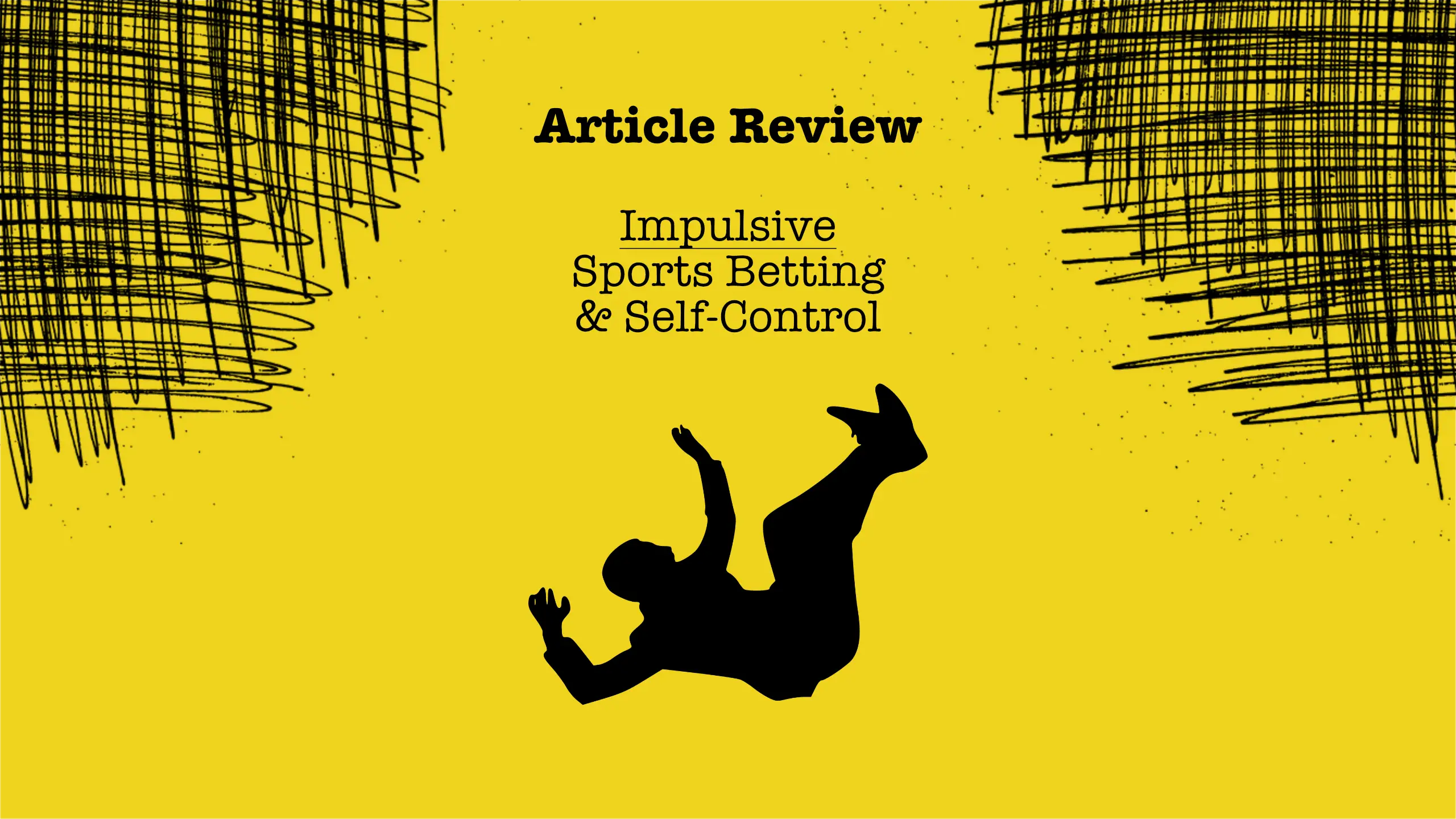Impulsivity is a central feature of problematic sports betting. In Impulsive Sports Betting: The Effects of Food or Substance Consumption (Li et al., 2020), the authors examine how biological and environmental factors — such as hunger, alcohol, and recreational drug use — contribute to impulsive gambling behavior.
Based on data from 1,211 Australian participants, the study found that problem gambling severity was positively associated with impulsive bet size. The research further revealed that consumption-related states, alongside promotional, social, and financial influences, interact to heighten impulsive decision-making.
The findings underline the importance of promoting self-control strategies and responsible gambling practices, such as avoiding substance use while betting, setting strict financial and time limits, and refraining from viewing gambling as a means of income generation.
Key Ideas
1. Context and purpose of the study
Australia has the highest average gambling losses per adult in the world, making it an ideal context for investigating impulsive betting behavior.
The study sought to identify how physiological states (hunger, intoxication, fatigue) and external influences (promotions, social pressure, and financial triggers) interact to impair self-regulation during gambling.
The Problem Gambling Severity Index (PGSI) was employed to screen participants and assess their vulnerability to impulsive and risky betting.
2. Self-control and impulsivity in sports betting
Impulsivity in gambling is closely linked to temporary reductions in self-control, often triggered by fatigue, hunger, or substance use.
The authors note that decision fatigue — a cognitive state in which willpower is depleted — can diminish a person’s ability to resist immediate urges, including the impulse to bet.
As hunger, alcohol consumption, or recreational drug use increased, participants reported making larger and more impulsive bets. These consumption factors were also indirectly associated with impulsivity through promotional and financial influences.
3. Promotional, social, and financial influences
Advertising, social contexts, and access to disposable income all contribute to impulsive betting behavior.
- Promotional influences (e.g., bonus offers, free bets) create a false sense of opportunity and urgency.
- Social influences (e.g., betting with friends) normalize impulsive decisions through peer approval.
- Financial influences (e.g., perceived ability to “win back losses”) encourage high-risk wagers.
Gamblers with lower PGSI scores — those at lower risk of problem gambling — were less influenced by such financial and social factors, suggesting that problem severity correlates with impulsivity and external influence susceptibility.
4. Psychological and physiological mechanisms
The findings align with the ego-depletion theory (Baumeister et al., 2007), which posits that self-control relies on finite cognitive and physiological resources.
When depleted — through hunger or intoxication — individuals are less capable of regulating impulsive behaviors.
This framework helps explain why substance use and hunger can both elevate impulsive betting tendencies: they reduce cognitive capacity for self-regulation while heightening emotional reactivity and reward sensitivity.
5. Implications for harm prevention
The study recommends several preventive and self-regulatory strategies:
- Avoid betting under the influence of alcohol or drugs.
- Do not gamble while hungry or fatigued.
- Set explicit money and time limits before gambling sessions.
- Avoid viewing gambling as a source of income or financial problem-solving.
Public education campaigns should highlight these behavioral and physiological risk factors to improve gambling literacy and support evidence-based harm reduction.
6. Methodological considerations
While the study offers valuable insights, the self-report nature of the data introduces potential recall and social desirability biases.
Further research using account-based or real-time behavioral data would enhance the accuracy of findings and help clarify causal mechanisms behind impulsive betting.
Selected Citations
- “Problem gambling severity was positively associated with impulsive bet size.”
- “As hunger, alcohol consumption, or recreational drug consumption increased, impulsive bet size also increased.”
- “Feeling fatigued about making decisions may jeopardize individuals’ capabilities in controlling themselves and resisting the impulse to bet on sports.”
- “Control strategies such as setting a money or time limit were found to be effective in preventing impulsive betting.”
Academic Reference
Li, E., Hing, N., Russell, A., & Vitartas, P. (2020). Impulsive Sports Betting: The Effects of Food or Substance Consumption. Journal of Gambling Studies, 36, 1–16.
External References
- Amos, C., Holmes, G., & Keneson, W. (2014). A Meta-Analysis of Consumer Impulse Buying. Journal of Retailing and Consumer Services, 21, 86–97.
- Ferris, J., & Wynne, H. (2001). The Canadian Problem Gambling Index: Final Report. Ottawa, ON: Canadian Centre on Substance Abuse.
- Gailliot, M. T., Baumeister, R. F., DeWall, C. N., Maner, J. K., Plant, E. A., Tice, D. M., & Schmeichel, B. J. (2007). Self-Control Relies on Glucose as a Limited Energy Source: Willpower Is More Than a Metaphor. Journal of Personality and Social Psychology, 92(2), 325–336.
- Hing, N., Li, E., Vitartas, P., & Russell, A. M. T. (2017). Wagering on E-sports: A New Battleground for Gambling and Its Intersection with Gaming. Gaming Law Review, 21(2), 146–152.
- Ioannidis, K., Hook, R. W., & Chan, C. C. (2019). Impulsivity and Its Associations with Problem Gambling Across Individual, Dyadic, and Situational Levels of Analysis. Journal of Gambling Studies, 35(2), 377–394.
- Roberts, J. A., & Manolis, C. (2012). Exploring the Impact of Motivational and Personality Factors on Online Impulse Buying. Journal of Marketing Theory and Practice, 20(1), 63–77.
- Vohs, K. D., & Faber, R. J. (2007). Spent Resources: Self-Regulatory Resource Availability Affects Impulse Buying. Journal of Consumer Research, 33(4), 537–547.
- Zhou, L., & Wong, A. (2004). Consumer Impulse Buying and In-Store Stimuli in Chinese Supermarkets. Journal of International Consumer Marketing, 16(2), 53–77.
